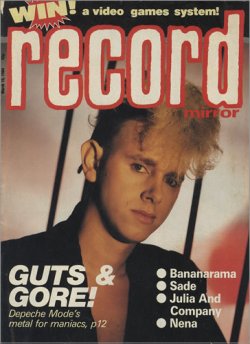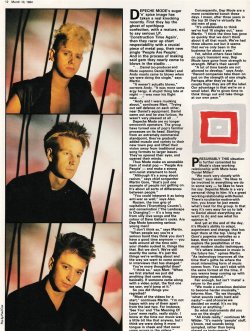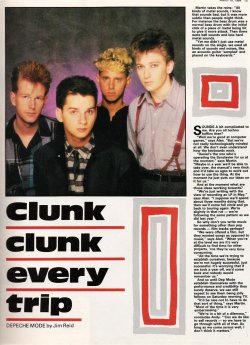Clunk Clunk Every Trip
[Record Mirror, 10th March 1984. Words: Jim Reid. Pictures: Uncredited.]
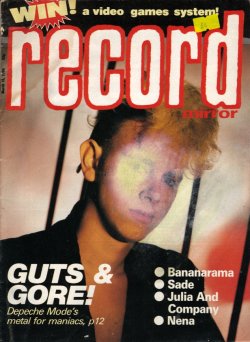
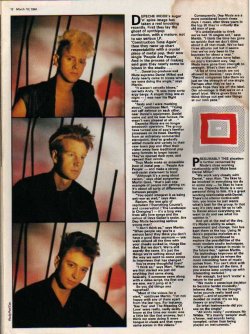
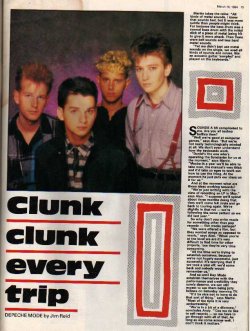
CLUNK CLUNK EVERY TRIP
Depeche Mode's sugar 'n' spice image has taken a real knocking recently. First they lay the ghost of synthipop confection, with a mature, not to say serious LP, "Construction Time Again", then they razor up chart respectability with a crucial piece of metal pop, their new single "People Are People". And in the process of making said gem they nearly come to blows in the studio...
"...Daniel (co-producer and Mute supremo Daniel Miller) and Andy nearly came to blows when we were doing the single," says Martin.
"It weren't actually blows," corrects Andy. "It was more sorta argy bargy. A stupid thing late at night - I was near his flight case..."
"Andy and I were mucking about," continues Mart. "Trying out self defence on each other, near Daniel's equipment. Daniel came out and he was furious. He wasn't very pleased at all..."
Depeche Mode are no longer smooooth operators. The group have turned one of pop's familiar processes on its head. Starting from an extremely commercial standpoint, they've gradually added muscle and variety to their new town pop and lifted their vision away from traditional pop song formats to larger issues. They've opened their eyes, and opened their minds.
Thus Mode make an accessible item of metal pop - "People Are People" - and make a strong anti-racist statement to boot.
"Although it's a song about racism," says chief songwriter Martin Gore, "that's just one example of people not getting on. It's about all sorts of differences between people."
"You could interpret it as being anti-war as well," says Alan.
Racism, the iron grip of capitalism ("Everything Counts"), and conservation ("The Landscape is Changing") - it's a long way from silly love songs and the colour of Dave Gahan's socks. Are Dep Mode becoming serious young men?
"I don't think so," says Martin. "When people say you're a serious band they think you don't have a good time anymore - you walk around all the time with your cheeks sucked in, things like that. But we don't. We're still exactly the same. It's just the things we're writing about and the way we want to come across in interviews that has changed."
You're more thoughtful then?
"I think so," says Mart. "When we first started we just did anything that came along, basically. If someone came along with a video script, the first one we saw, we'd jump at it."
So you did things you regretted?
"Most of the videos for a start," continues Martin. "I'm not happy with any of them apart from the last two. For instance, "See You" and "The Meaning Of Love" were really, really sickly. I know at the time our music was a little bit like that anyway, but I think we were doing it more tongue in cheek and that never came across in the videos." [1]
Consequently, Dep Mode are a more considered bunch these days. I mean, after three years in the top 20 they're virtually the old men of pop.
"It's unbelievable to think we've had 10 singles out," says Martin. "I think the time has gone so quickly that we don't think about it all that much. We've had three albums out but it seems that we've only been in the business for about a year."
Yet, whilst others have fallen on pop's transient way, Dep Mode have gone from strength to strength. What's their secret?
"A lot of time bands are not allowed to develop," says Andy. "Record companies take them on just on the strength of one single. Perhaps after they've had a coupla flops they are off the label. Our advantage is that we're on a small label. We're given time to think things out and take things at our own pace."
Presumably this situation is further cemented by Mode's close working relationship with Mute boss Daniel Miller?
"We work very closely with Daniel," says Alan. "He likes to be involved in everything we do in some way - he likes to have his say. Depeche Mode is a very personal thing to him. It's a great working relationship with Daniel. There's no ulterior motive with him, you know he just wants what's best for the group. In that way it's very easy for us to talk to Daniel about everything we want to do and see what his opinion is."
And yet at the end of the day, it's Mode's ability to adapt, experiment and change, that has kept them at the top. Using M Gore's popwise melodies as a base, they've continued to explore the possibilities of the most modern studio techniques.
"It's where interest in music in the future lies," opines Martin. "As technology improves all the time that's gotta be where the most interesting form of music comes from. You can't stick with the same format all the time, if you wanna keep coming up with interesting material."
Fair enough, but isn't 'metal' a return to the past?
"We made a conscious decision to become harder musically," informs Alan. "So we thought, 'what sounds really hard and nasty?' - and of course we decided on metal. It's no big theory or anything."
So what instruments did you use on the single?
"All kinds really," continues Mr Wilder. "It's mainly 'sample' stuff, y'know, real sounds being sampled, rather than being played on instruments."
Martin takes the reins: "All kinds of metal sounds, I know that sounds bad, but it was more subtle than people might think. For instance the bass drum was a normal bass drum with the initial click of a piece of metal being hit to give it more attack. Then there were bell sounds and less hard metal sounds.
"Yet we didn't use just metal sounds on the single, we used all kinds of sounds and noises, like an acoustic guitar 'sampled' and played on the keyboards."
Sounds a bit complicated to me. Are you all techno boffins then?
"Well we're good at computer games," says Alan. "But we're not really technologically minded at all. We don't even understand how the keyboards work.
"Daniel's the one who's operating the Synclavier for us at the moment," says Martin. "Maybe in a year we'll be able to take over, the manual's very thick and it'd take us ages to work out how to use the thing. At the moment he just puts our ideas on it for us."
And at the moment what are those ideas working towards?
"We're just writing with the view of recording an LP in May," says Alan. "I suppose we'll spend about three months doing that, then we'll come full circle and go back to touring again. We're slightly in that rut - we're following the same pattern as we did last year."
So why don't you write music for something other than pop records - film tracks perhaps?
"We were offered a film, but they wanted songs as opposed to music," says Alan. "When you're at the level we are it's very difficult to find time for other projects, 'cos they're very time consuming.
"All the time we're trying to establish ourselves, because we're not hugely successful. It's worrying that if we took a year off, we'd come back and nobody would remember us."
And so until Dep Mode establish themselves with the performance and credibility they surely deserve, we can still expect to see them being jolly fellows on Saturday morning TV.
"It'd be nice not to have to do that sort of thing," says Martin. "Most of the time it is very embarrassing."
"We're in a bit of a dilemma," concludes Andy. "'Cos we do like to sell records - so we do have to go through with all of that. As long as we come across well, I don't think it matters."
[Record Mirror, 10th March 1984. Words: Jim Reid. Pictures: Uncredited.]
Interview of Andy, Martin and Alan shortly after the release of People Are People, examining their continued move towards a harder, more metallic sounds. The article concentrates on why and how they decided to broaden their horizons, and goes into some detail on the processes involved in making the more recent singles. Surprisingly easy to read given the subject matter.
" "It's where interest in music in the future lies," opines Martin. "As technology improves all the time that's gotta be where the most interesting form of music comes from. You can't stick with the same format all the time, if you wanna keep coming up with interesting material." "
Summary: Interview of Andy, Martin and Alan shortly after the release of People Are People, examining their continued move towards a harder, more metallic sounds. The article concentrates on why and how they decided to broaden their horizons, and goes into some detail on the processes involved in making the more recent singles. Surprisingly easy to read given the subject matter. [1299 words]



CLUNK CLUNK EVERY TRIP
Depeche Mode's sugar 'n' spice image has taken a real knocking recently. First they lay the ghost of synthipop confection, with a mature, not to say serious LP, "Construction Time Again", then they razor up chart respectability with a crucial piece of metal pop, their new single "People Are People". And in the process of making said gem they nearly come to blows in the studio...
"...Daniel (co-producer and Mute supremo Daniel Miller) and Andy nearly came to blows when we were doing the single," says Martin.
"It weren't actually blows," corrects Andy. "It was more sorta argy bargy. A stupid thing late at night - I was near his flight case..."
"Andy and I were mucking about," continues Mart. "Trying out self defence on each other, near Daniel's equipment. Daniel came out and he was furious. He wasn't very pleased at all..."
Depeche Mode are no longer smooooth operators. The group have turned one of pop's familiar processes on its head. Starting from an extremely commercial standpoint, they've gradually added muscle and variety to their new town pop and lifted their vision away from traditional pop song formats to larger issues. They've opened their eyes, and opened their minds.
Thus Mode make an accessible item of metal pop - "People Are People" - and make a strong anti-racist statement to boot.
"Although it's a song about racism," says chief songwriter Martin Gore, "that's just one example of people not getting on. It's about all sorts of differences between people."
"You could interpret it as being anti-war as well," says Alan.
Racism, the iron grip of capitalism ("Everything Counts"), and conservation ("The Landscape is Changing") - it's a long way from silly love songs and the colour of Dave Gahan's socks. Are Dep Mode becoming serious young men?
"I don't think so," says Martin. "When people say you're a serious band they think you don't have a good time anymore - you walk around all the time with your cheeks sucked in, things like that. But we don't. We're still exactly the same. It's just the things we're writing about and the way we want to come across in interviews that has changed."
You're more thoughtful then?
"I think so," says Mart. "When we first started we just did anything that came along, basically. If someone came along with a video script, the first one we saw, we'd jump at it."
So you did things you regretted?
"Most of the videos for a start," continues Martin. "I'm not happy with any of them apart from the last two. For instance, "See You" and "The Meaning Of Love" were really, really sickly. I know at the time our music was a little bit like that anyway, but I think we were doing it more tongue in cheek and that never came across in the videos." [1]
Consequently, Dep Mode are a more considered bunch these days. I mean, after three years in the top 20 they're virtually the old men of pop.
"It's unbelievable to think we've had 10 singles out," says Martin. "I think the time has gone so quickly that we don't think about it all that much. We've had three albums out but it seems that we've only been in the business for about a year."
Yet, whilst others have fallen on pop's transient way, Dep Mode have gone from strength to strength. What's their secret?
"A lot of time bands are not allowed to develop," says Andy. "Record companies take them on just on the strength of one single. Perhaps after they've had a coupla flops they are off the label. Our advantage is that we're on a small label. We're given time to think things out and take things at our own pace."
Presumably this situation is further cemented by Mode's close working relationship with Mute boss Daniel Miller?
"We work very closely with Daniel," says Alan. "He likes to be involved in everything we do in some way - he likes to have his say. Depeche Mode is a very personal thing to him. It's a great working relationship with Daniel. There's no ulterior motive with him, you know he just wants what's best for the group. In that way it's very easy for us to talk to Daniel about everything we want to do and see what his opinion is."
And yet at the end of the day, it's Mode's ability to adapt, experiment and change, that has kept them at the top. Using M Gore's popwise melodies as a base, they've continued to explore the possibilities of the most modern studio techniques.
"It's where interest in music in the future lies," opines Martin. "As technology improves all the time that's gotta be where the most interesting form of music comes from. You can't stick with the same format all the time, if you wanna keep coming up with interesting material."
Fair enough, but isn't 'metal' a return to the past?
"We made a conscious decision to become harder musically," informs Alan. "So we thought, 'what sounds really hard and nasty?' - and of course we decided on metal. It's no big theory or anything."
So what instruments did you use on the single?
"All kinds really," continues Mr Wilder. "It's mainly 'sample' stuff, y'know, real sounds being sampled, rather than being played on instruments."
Martin takes the reins: "All kinds of metal sounds, I know that sounds bad, but it was more subtle than people might think. For instance the bass drum was a normal bass drum with the initial click of a piece of metal being hit to give it more attack. Then there were bell sounds and less hard metal sounds.
"Yet we didn't use just metal sounds on the single, we used all kinds of sounds and noises, like an acoustic guitar 'sampled' and played on the keyboards."
Sounds a bit complicated to me. Are you all techno boffins then?
"Well we're good at computer games," says Alan. "But we're not really technologically minded at all. We don't even understand how the keyboards work.
"Daniel's the one who's operating the Synclavier for us at the moment," says Martin. "Maybe in a year we'll be able to take over, the manual's very thick and it'd take us ages to work out how to use the thing. At the moment he just puts our ideas on it for us."
And at the moment what are those ideas working towards?
"We're just writing with the view of recording an LP in May," says Alan. "I suppose we'll spend about three months doing that, then we'll come full circle and go back to touring again. We're slightly in that rut - we're following the same pattern as we did last year."
So why don't you write music for something other than pop records - film tracks perhaps?
"We were offered a film, but they wanted songs as opposed to music," says Alan. "When you're at the level we are it's very difficult to find time for other projects, 'cos they're very time consuming.
"All the time we're trying to establish ourselves, because we're not hugely successful. It's worrying that if we took a year off, we'd come back and nobody would remember us."
And so until Dep Mode establish themselves with the performance and credibility they surely deserve, we can still expect to see them being jolly fellows on Saturday morning TV.
"It'd be nice not to have to do that sort of thing," says Martin. "Most of the time it is very embarrassing."
"We're in a bit of a dilemma," concludes Andy. "'Cos we do like to sell records - so we do have to go through with all of that. As long as we come across well, I don't think it matters."
[1] - The band dislike some of their early videos so much that four of them ('See You', 'The Meaning Of Love', 'Leave In Silence' and 'Get The Balance Right') were not included on the 1985 video compilation "Some Great Videos" or its 1998 re-issue.

